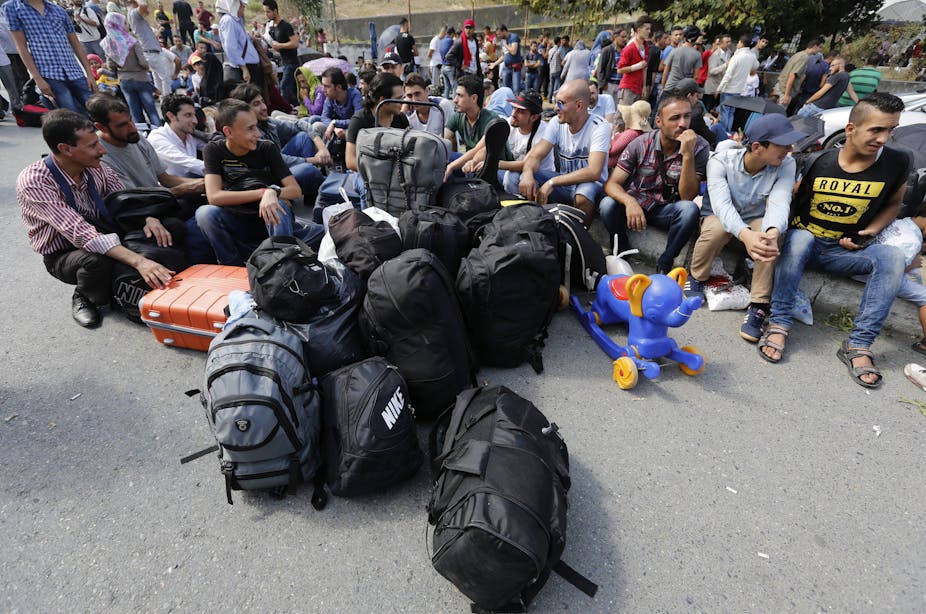Are some countries more compassionate than others when it comes to taking in the victims of conflict and chaos? To judge from the numbers, one might be forgiven for thinking so. Of the four million registered Syrian refugees, Turkey is currently home to nearly two million. Despite its own growing economic and social problems, Lebanon is host to another million. Even Iraq currently has more than 250,000.
When people are fleeing to Iraq in search of sanctuary it is clear that their situation must be pretty desperate. As we know all too well by now, it is. That the Syrian exodus has thus far ended primarily in Turkey and Lebanon is not because these countries are necessarily more compassionate, but because they are Syria’s immediate neighbours. In other words, they have limited capacity to stem the inflow even if they wanted to.
Much the same story could be told about Pakistan. It is hard to imagine that poor, unstable Pakistan would top many people’s list of most-attractive destinations for a new life. But Pakistan currently has more than 1.5 million refugees within its rather porous borders, most of whom have fled even more hellish conditions in Afghanistan.
Afghanistan highlights another seemingly irresolvable, unimprovable aspect of today’s global refugee crisis. Whatever one may think about the motives for American and Australian involvement in that benighted country, the simple reality is that efforts of “state-building” have conspicuously failed, despite the billions spent in trying.
The prospects for security and stability look as remote as ever in Afghanistan and the desire of many of its inhabitants to flee looks likely to increase as a result.
What is to be done? It has rapidly become apparent that no matter how normatively desirable and admirable a policy of open borders may be in theory, in Europe, at least, it has survived little more than a week or so in practice. The simple reality is that there are limits to the numbers people that can be accommodated – or accommodated in the sort of First World conditions that Europeans presumably wish to see, at least.
As Europe begins to close its borders in the face of unprecedented inflows of would-be asylum seekers, the limits of compassion are being brutally exposed. Whether Europe will have the capacity to shut its doors even if it decides it collectively wants to do so remains to be seen. The acrimony the crisis is likely to cause among EU members as they try to deal with stranded asylum seekers will be a major test of European solidarity. It is one the organisation as a whole may not pass or even survive.
Britain may be the bellwether European nation in this context, where immigration is already a highly sensitive and divisive subject. But the UK can act in ways that other EU states cannot. Because Britain is an island, it has greater capacity to determine who can enter and who cannot.
The already substantial minority that are deeply sceptical about the European project may become even more influential if Britain is compelled to accept large numbers of asylum seekers as part of a European wide deal. Britain could lead the breakup of the EU.
The current migrant crisis is a painful reminder of the limits of so-called “globalisation”. Far from disappearing in some seamless web of interconnectivity and interdependence, borders remain as important as ever in determining fundamental questions about life chances – even about life itself.
To be born an Englishman during Queen Victoria’s reign was seen as winning the lottery of life. Such smug condescension may not seem quite so compelling these days, but there is no doubt that our lives are still determined by happenstance and serendipity to a much greater extent than we may care to admit.
It is striking that countries that are able to protect those fortunate enough to be geographic and political insiders are increasingly likely to do so. Australia may be one of the most conspicuous and “successful” countries in this regard, but it is far from unique. Japan – another island – is also highly sensitive about immigration and what it sees as questions of social cohesion.
Perhaps the key test and shaper of global trends in this area – as in so many others – will ultimately prove to be the United States. The US is no longer the default option for the world’s poor, downtrodden, huddled masses. Despite having a role in creating some of the world’s most pressing refugee flows, it is not keen to open its doors wide either.
The US offer to take in 10,000 refugees from Syria looks paltry. Likewise, fewer than 100,000 have been accepted from Iraq, despite America’s role in dismembering the country. Donald Trump epitomises a rising tide of opposition even to crossborder migration from relatively affluent Mexico. Fellow feeling clearly has its limits and they continue to be defined by geography and race.
It is hard imagine more unambiguous and implacable challenge to some of most cherished values than the current migration crisis. We like to think of ourselves as compassionate and generous. We may be about to discover the conditions under which such values can actually endure and the circumstances that allow them to be put into practice.

